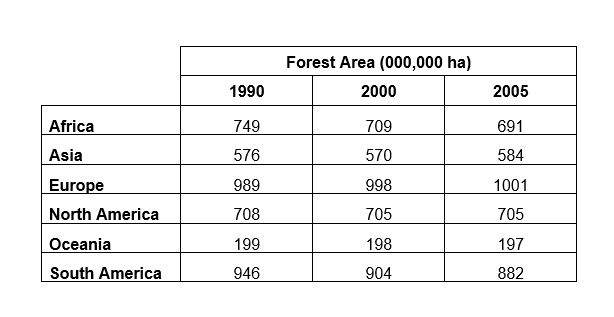The table shows forested land in millions of hectares in different parts of the world.
Summarise the information by selecting and reporting the main features, and make comparisons where relevant.
The table compares the data in terms of forested land in different continents of the world in the years 1990, 2000 and 2005 respectively.
Overall, the forest area in Africa, Oceania and South America experienced a downward trend throughout the period, while the forested land in Europe showed a steady but significant rise. In addition, the forest area in North America and Asia underwent fluctuations over the period.
In 1990 the forest area in Africa and South America were 749 and 946 million hectares respectively. The forest area in both continents decreased sharply over a decade. After another five years forest area in both continents declined from 709 to 691 and from 904 to 882 million hectares continually. In contrast, despite the forest area in Oceania showed a dropping tendency, it experienced only a slight decrease from 199 to 198 million hectares between 1990 to 2000 and then dropped another one million hectare to reach 197 million hectares at the end of the period.
The forest area in Europe was 989 million hectares in the beginning of the period which illustrated a gradual declined growth. It went up nine million hectares over a decade and then increased subsequently three million hectares after five years. Besides, both forest areas in Asia and North America went down 6 and 3 million hectares from 1990 to 2000. In 2005, the forest area in Asia hit a high-point of 584 million hectares rapidly while North America remained steady.
If possible, I want to know what brand I could score now because I am preparing my IELTS. Please also let me know the problems that I should avoid. Thank you.

Task image
